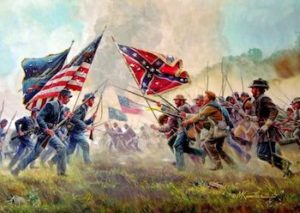
The American Civil War, waged from 1861 to 1865, is remembered on this date.
Before and during this military conflict, the American North and South differed greatly on economic issues. The war was about the presence of slavery (but primarily its economic consequence). The northern elite wanted the monetary expansion to change the southern (slave-holding) way of life.
The southern states saw Abraham Lincoln and the Republican Party making enormous changes to their way of life using free slave labor. Southerners believed that Abraham Lincoln, if elected, would restrict their rights to own slaves. When Lincoln became President, 11 southern states seceded rather than give up their economic system and way of life. Lincoln and the North opposed the South's withdrawal.
The President steadfastly maintained throughout the war that secession was illegal and that the newly formed Confederate States of America were not valid as a new nation. Both sides knew that the financial advantages of slavery (not the moral position) conflicted with them. Slavery translated into money for the southern region. Lincoln had hoped that the secession would end without conflict. Immediate sparks that set off the conflict included John Brown’s raid on Harpers Ferry in 1859, which Brown, a white abolitionist, undertook as part of his mission to free slaves. The Union Army, trying to repossess the federal base at Fort Sumter, fired the first shots of the Civil War.
The North held many advantages over the South during the Civil War. Its population was several times that of the South, a potential source for military enlistees and civilian manpower. The South lacked the substantial number of factories and industries that the North had, which produced the needed war materials. The North had a better transportation network, primarily consisting of highways, canals, and railroads, which could be efficiently utilized to resupply military forces in the field. The Union Navy was more capable and dominant at sea, while the army was better trained and supplied. The rest of the world recognized the United States as a legitimate government, allowing U.S. diplomats to obtain loans and other trade concessions.
The South had fewer advantages, but among them was that it fought on its home terrain. The South also had a military tradition that encouraged young men to serve in the armed forces or attend a military school; many had served in the U.S. military before the Civil War, only to resign and fight for their states and families. In addition, the South had the leadership of great commanders, including Robert E. Lee, Joseph Johnston, and "Stonewall" Jackson.
The North had to achieve several goals to defeat the South: 1. Secure Control of the Mississippi River to allow unimpeded movement of needed Western goods; 2. Cut off the South from international traders and smugglers that could aid the Southern war effort; 3. Take the Confederate army out of action to prevent further northward attacks such as that at Gettysburg, Pennsylvania, and to ease the battle losses of the North; 4. Stop the South's ability to produce the goods and war materials it needs.
The South had to counter these measures with its plans to capitalize on early victories, weaken the Northern resolve to fight, gain international recognition as a sovereign state, and keep Union forces from seizing Confederate territory. The South did not achieve its goals, and after nearly four years of fighting, the North emerged victorious in the war.
Another disadvantage for the South was that it had to worry about its slave population, which posed the threat of rebellion and assistance to the Northern cause. Regardless of the financial interest of whites (North or South), Blacks wanted to be free from slavery. In addition, the North suffered because a series of senior generals did not successfully exploit the weaknesses of the South, nor did they act upon the suggestions of their President. Lincoln finally got his desired general in Ulysses S. Grant, who had solidified the Union's control of the West in parts of the Mississippi River Basin. Grant directed the defeat of Southern forces and strongholds and held off determined advances northward by Confederates on several occasions before the surrender of General Lee to General Grant in 1865.
The Southern fears were worsened when the North issued the Emancipation Proclamation, which legally ended slavery in all territories held by Union troops, but not in all areas of the North, such as loyal but slave-owning states along the borders of the two powers. Had the North tried to free slaves in these areas, more aid would have been generated for the South, and slave-owning Maryland's secession would have left the U.S. capital to the Confederates. The troublesome, negative conflict has cast a shadow on the successes of America ever since. The country had to find ways to heal the wounds of war during Reconstruction, which fell to the political and innermost values of whites in the South and the North.
The National Archives.
Sherman's March
by Davis, Burke,
New York: Vintage Books, 1991.
Civil War Curiosities
by Garrison, Webb,
Nashville: Rutledge Hill Press, 1994
Howard Zinn, A People’s History of the United States
HarperCollins 1980.
Civil War Curiosities
by Garrison, Webb,
Nashville: Rutledge Hill Press, 1994